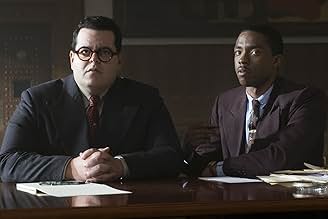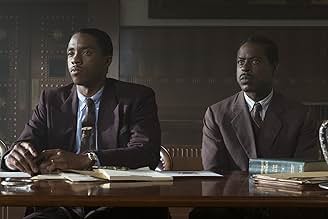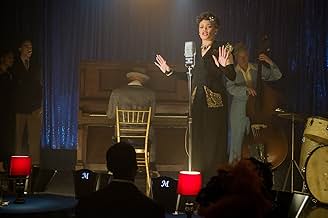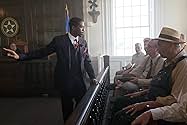AVALIAÇÃO DA IMDb
7,3/10
28 mil
SUA AVALIAÇÃO
Relata a história de Thurgood Marshall, o advogado que se tornaria o primeiro juiz afro-americano da Suprema Corte, enquanto luta contra um dos casos decisivos da sua carreira.Relata a história de Thurgood Marshall, o advogado que se tornaria o primeiro juiz afro-americano da Suprema Corte, enquanto luta contra um dos casos decisivos da sua carreira.Relata a história de Thurgood Marshall, o advogado que se tornaria o primeiro juiz afro-americano da Suprema Corte, enquanto luta contra um dos casos decisivos da sua carreira.
- Direção
- Roteiristas
- Artistas
- Indicado a 1 Oscar
- 5 vitórias e 21 indicações no total
Jeremy Bobb
- John Strubing
- (as Jeremy Lowell Bobb)
- Direção
- Roteiristas
- Elenco e equipe completos
- Produção, bilheteria e muito mais no IMDbPro
Avaliações em destaque
This enjoyable and inspiring movie is a worthy contribution to the courtroom movie genre. It memorializes the great Thurgood Marshall (who later won Brown v. Bd. of Education and sat on the Supreme Court). The film brings to life a forgotten rape case in Connecticut that Marshall tried early in his career when he was the solo staff lawyer at the NAACP. The story focuses on the plight of a black man accused of raping a white woman and it highlights issues of racism in the courtroom and on the streets. The movie recalls the classic fllms "To Kill a Mockingbird" (which also involved a black on white rape case) and "Anatomy of a Murder" (which also involved sexual issues and in which--like many real trials--we're never sure just what actually happened and who is telling the truth). The writing is sharp and witty and the acting and direction are great. Particularly strong is the emerging partnership and friendship of Marshall and the local lawyer, Sam Friedman, who had never tried a criminal case and thought he would just sit next to Marshall during the trial and and do nothing. But the judge forces Friedman to conduct the trial with Marshall serving as his adviser--and he rises to the occasion.
With the premiere of Marshall actor Chadwick Boseman has now played three cultural black icons. First there was James Brown the Godfather of Soul, then it was Jackie Robinson the first black player in modern times in major league baseball. Now it is Thurgood Marshall, but Marshall in his early days as a lawyer for the National Association For The Advancement Of Colored People.
Thurgood Marshall in his career litigated many major civil rights cases including the most famous of all Brown vs. Board Of Education in 1954 that integrated the school system nationwide. Later on his career was capped by becoming the first black justice on the Supreme Court.
This story takes place in the late 30s by the music and the radio broadcasts with the news of the day. Thurgood Marshall has been sent to Connecticut to defend Sterling K. Brown a black chauffeur on a charge of raping his employer Kate Hudson.
This may be the north, but the racial attitudes in Greenwich, Connecticut are only more subdued than they are in Alabama. Fairfield County in those days in the richer suburban towns are pretty bad. You remember from Auntie Mame the phrase, Aryan from Darien. They're not crazy about Jews either.
Marshall being an outsider to the state has to be admitted to the Connecticut bar. Local attorney Sam Friedman played by Josh Gad is the lead counsel temporarily and the first motion is to get Marshall admitted. That is usually a pro forma thing, note how Matt Damon has to be admitted to the bar in Tennessee in The Rainmaker.
Such courtesy is denied Marshall by Judge James Cromwell. But he's allowed to sit at the defense table and coach Friedman. Despite a few curves thrown at the defense Gad who only did civil cases before this for insurance companies proves to be a pretty good advocate.
Boseman steps up to his role just as he did with Jackie Robinson and James Brown. He also has some wonderful domestic scenes with his wife Keesha Sharp and at a nightclub with Jussie Smollett and Chilli Thomas as Langston Hughes and Zora Neale Hurston. Good performances you think these are the real people.
Thurgood Marshall was also portrayed on screen by Sidney Poitier in the film Separate But Equal dealing with the school integration cases right up to the Supreme Court. These two really ought to be seen back to back for a full assessment of Marshall's career.
In his time when Lyndon Johnson appointed Marshall to the Supreme Court it wasn't just race that made Marshall's appointment unique. It was the whole level of experience in the kind of law he practiced for people like Sterling K. Brown. The goal is justice and the law has to work for all for justice to be realized.
Marshall is a film not to be missed.
Thurgood Marshall in his career litigated many major civil rights cases including the most famous of all Brown vs. Board Of Education in 1954 that integrated the school system nationwide. Later on his career was capped by becoming the first black justice on the Supreme Court.
This story takes place in the late 30s by the music and the radio broadcasts with the news of the day. Thurgood Marshall has been sent to Connecticut to defend Sterling K. Brown a black chauffeur on a charge of raping his employer Kate Hudson.
This may be the north, but the racial attitudes in Greenwich, Connecticut are only more subdued than they are in Alabama. Fairfield County in those days in the richer suburban towns are pretty bad. You remember from Auntie Mame the phrase, Aryan from Darien. They're not crazy about Jews either.
Marshall being an outsider to the state has to be admitted to the Connecticut bar. Local attorney Sam Friedman played by Josh Gad is the lead counsel temporarily and the first motion is to get Marshall admitted. That is usually a pro forma thing, note how Matt Damon has to be admitted to the bar in Tennessee in The Rainmaker.
Such courtesy is denied Marshall by Judge James Cromwell. But he's allowed to sit at the defense table and coach Friedman. Despite a few curves thrown at the defense Gad who only did civil cases before this for insurance companies proves to be a pretty good advocate.
Boseman steps up to his role just as he did with Jackie Robinson and James Brown. He also has some wonderful domestic scenes with his wife Keesha Sharp and at a nightclub with Jussie Smollett and Chilli Thomas as Langston Hughes and Zora Neale Hurston. Good performances you think these are the real people.
Thurgood Marshall was also portrayed on screen by Sidney Poitier in the film Separate But Equal dealing with the school integration cases right up to the Supreme Court. These two really ought to be seen back to back for a full assessment of Marshall's career.
In his time when Lyndon Johnson appointed Marshall to the Supreme Court it wasn't just race that made Marshall's appointment unique. It was the whole level of experience in the kind of law he practiced for people like Sterling K. Brown. The goal is justice and the law has to work for all for justice to be realized.
Marshall is a film not to be missed.
Greetings again from the darkness. The question must be asked: is the movie worthy of the man? The man was the first attorney for the NAACP. He won 29 of the 32 cases he argued in front of the U.S. Supreme Court, including the ground-breaking 1954 Brown v. Board of Education (separate but equal public education). This man was a trailblazer for Civil Rights, and in 1967 became the first African- American Supreme Court Justice. This man was, of course, Thurgood Marshall
a man who unquestionably deserves not just a movie, but a really good and important one.
Chadwick Boseman has taken on film versions of such icons as Jackie Robinson in 42 and James Brown in GET ON UP, so he likely jumped at the chance to play the revered figure, Thurgood Marshall. Mr. Boseman has true movie star screen presence, and supplies the young Mr. Marshall with a self-assured swagger that accompanies a brilliant legal mind – a mind that refused to be ignored during a time it was desperately needed. Lest he be labeled a superhero, the film does portray Marshall smoking and drinking, while also hinting at his carousing. The common flaws of a great man.
It's 1941 and the young (33 years old) Marshall is the lone NAACP attorney, so he spends his time ping-ponging around the country fighting for fair trials for those African-Americans accused simply because they aren't white. He works only for "innocent" people and his efforts during this time were crucial to the Civil Rights movement gaining attention and legitimacy. Most of the film centers on a case in Connecticut (no, not the Jim Crow south) where a black man, Joseph Spell (Sterling K Brown), is accused of sexual assault of a "respectable" married white woman, Eleanor Strubing (Kate Hudson). If you are reminded of the great book and film TO KILL A MOCKINGBIRD, you must know that those literary and cinematic standards are such that few can ever hope to reach.
What follows is not one of the more dramatic or tension-filled cinematic courtroom dramas. There is simply too much levity for the film to be classified as a historical heavyweight. That said, the man and his story are fascinating, and though director Reginald Hudlin chooses a deft touch rather than a sledge hammer, it's likely the wise choice if the goal is to entertain, while also educating the masses to Marshall's early career. Josh Gad co-stars as Marshall's co-counsel Sam Friedman, a specialist in legal technicalities within the insurance industry. Boseman and Gad have nice chemistry (at times it feels like a buddy movie), and as a Jew in those times, Friedman is himself stuck in limbo between staunch racism and acceptance by the white community.
James Cromwell plays Judge Foster, yet another man caught between the old world he has lived in his entire life and the fast-changing society and legal system that permits him to silence Marshall, while also forcing (somewhat) fair treatment of the accused Spell. Dan Stevens (BEAUTY AND THE BEAST) is Loren Willis, the disgusted and disgusting prosecutor. This character is so cartoonish that the only thing missing is a neon necklace that flashes "racist" as he speaks. Sophia Bush has a brief, yet important scene and Sterling K Brown (as Mr. Spell) has the film's most heart-breaking moment as he sits on the stand and explains why he lied.
Director Reginald Hudlin seems like an odd choice for the project. He has been working mostly in TV since back-to-back-to-back bombs BOOMERANG (Eddie Murphy), THE LADIES MAN (Tim Meadow) and SERVING SARA (Matthew Perry). Mr. Hudlin has experienced more success as a Producer, having been Oscar nominated for DJANGO UNCHAINED. Here he works with the father and son screenwriters Jacob Koskoff and Michael Koskoff. The elder Michael is a well respected criminal attorney and legal historian, and certainly understands the expectations that come with offering a public look at a near- mythical figure especially one as revered as Thurgood Marshall.
This isn't so much a movie about the icon as it is about a young man on the path to greatness and importance (he served on the Supreme Court from 1967-1991). The soundtrack is filled with jazz which complements the light-hearted approach, and further distances from any semblance of "heavy" or "historical". Director Hudlin adds a contemporary touch by having Trayvon Martin's parents (Sybrina Fulton, Tracy Martin) appear in a scene near the end. On the downside, multiple upshot camera angles are designed to make his lead character look larger than life. The truth is, Thurgood Marshall required no help in looming large. Hopefully this mainstream approach pays off and many are introduced to the legacy of a man who is more than worthy of this movie and another.
Chadwick Boseman has taken on film versions of such icons as Jackie Robinson in 42 and James Brown in GET ON UP, so he likely jumped at the chance to play the revered figure, Thurgood Marshall. Mr. Boseman has true movie star screen presence, and supplies the young Mr. Marshall with a self-assured swagger that accompanies a brilliant legal mind – a mind that refused to be ignored during a time it was desperately needed. Lest he be labeled a superhero, the film does portray Marshall smoking and drinking, while also hinting at his carousing. The common flaws of a great man.
It's 1941 and the young (33 years old) Marshall is the lone NAACP attorney, so he spends his time ping-ponging around the country fighting for fair trials for those African-Americans accused simply because they aren't white. He works only for "innocent" people and his efforts during this time were crucial to the Civil Rights movement gaining attention and legitimacy. Most of the film centers on a case in Connecticut (no, not the Jim Crow south) where a black man, Joseph Spell (Sterling K Brown), is accused of sexual assault of a "respectable" married white woman, Eleanor Strubing (Kate Hudson). If you are reminded of the great book and film TO KILL A MOCKINGBIRD, you must know that those literary and cinematic standards are such that few can ever hope to reach.
What follows is not one of the more dramatic or tension-filled cinematic courtroom dramas. There is simply too much levity for the film to be classified as a historical heavyweight. That said, the man and his story are fascinating, and though director Reginald Hudlin chooses a deft touch rather than a sledge hammer, it's likely the wise choice if the goal is to entertain, while also educating the masses to Marshall's early career. Josh Gad co-stars as Marshall's co-counsel Sam Friedman, a specialist in legal technicalities within the insurance industry. Boseman and Gad have nice chemistry (at times it feels like a buddy movie), and as a Jew in those times, Friedman is himself stuck in limbo between staunch racism and acceptance by the white community.
James Cromwell plays Judge Foster, yet another man caught between the old world he has lived in his entire life and the fast-changing society and legal system that permits him to silence Marshall, while also forcing (somewhat) fair treatment of the accused Spell. Dan Stevens (BEAUTY AND THE BEAST) is Loren Willis, the disgusted and disgusting prosecutor. This character is so cartoonish that the only thing missing is a neon necklace that flashes "racist" as he speaks. Sophia Bush has a brief, yet important scene and Sterling K Brown (as Mr. Spell) has the film's most heart-breaking moment as he sits on the stand and explains why he lied.
Director Reginald Hudlin seems like an odd choice for the project. He has been working mostly in TV since back-to-back-to-back bombs BOOMERANG (Eddie Murphy), THE LADIES MAN (Tim Meadow) and SERVING SARA (Matthew Perry). Mr. Hudlin has experienced more success as a Producer, having been Oscar nominated for DJANGO UNCHAINED. Here he works with the father and son screenwriters Jacob Koskoff and Michael Koskoff. The elder Michael is a well respected criminal attorney and legal historian, and certainly understands the expectations that come with offering a public look at a near- mythical figure especially one as revered as Thurgood Marshall.
This isn't so much a movie about the icon as it is about a young man on the path to greatness and importance (he served on the Supreme Court from 1967-1991). The soundtrack is filled with jazz which complements the light-hearted approach, and further distances from any semblance of "heavy" or "historical". Director Hudlin adds a contemporary touch by having Trayvon Martin's parents (Sybrina Fulton, Tracy Martin) appear in a scene near the end. On the downside, multiple upshot camera angles are designed to make his lead character look larger than life. The truth is, Thurgood Marshall required no help in looming large. Hopefully this mainstream approach pays off and many are introduced to the legacy of a man who is more than worthy of this movie and another.
A look at the career of Thurgood Marshall. Maybe more people will know who he is and what exactly he accomplished.
Kudos entire cast was riveting!
Kudos entire cast was riveting!
I hate to say most, but there's a lot of biopics that are very formulaic in nature. And come to think of it, every genre deals with that issue. I can acknowledge that it's immensely hard to make a film that feels fresh and relevant at the same time. But I think the reason I tend to feel this way about biopics is because a lot of them seem to be directly aimed for the Oscar audience. And while that could be the case with Marshall, it's nothing less than a delightful film to watch.
As with so many biopics, the main reason Marshall succeeds is Chadwick Boseman's unsurprisingly good turn as the famous lawyer, Thurgood Marshall. Whether or not Thurgood was this way in real life, I absolutely loved the sheer display of confidence in Boseman's portrayal. It was almost to the point of cockiness, without being arrogant. It's that balance that made me appreciate what this man brought to the table.
Of course, there's also the dynamic of having a story that is still relevant to this day. Not only are people of color still discriminated, underestimated, and not believed in the court of law, but the idea of pitting race against race in the courtroom is something that is still unfortunately an issue today. So in a way, it was disheartening to watch the injustices happening throughout Marshall, as we know they are far from being over in the 1940's, but it's always nice to see something stick up for their people no matter what time period they are from.
Boseman isn't the only one who gives a good performance as Josh Gad, Sterling K. Brown, Kate Hudson, James Cromwell, and a few others give valuable turns as their respected characters. I think my only issue with the film is that it ultimately felt very safe. I'm not one to know how these real life cases played out, but Marshall definitely feels like it took a guarded approach to the subject matter. Because of that, you can appeal to a mass audience, but I don't know that it was as detailed or thorough that it needed to be. Don't get me wrong, Marshall is a powerful film, but I think it could have taken an even further step forward into that realm.
8.2/10
As with so many biopics, the main reason Marshall succeeds is Chadwick Boseman's unsurprisingly good turn as the famous lawyer, Thurgood Marshall. Whether or not Thurgood was this way in real life, I absolutely loved the sheer display of confidence in Boseman's portrayal. It was almost to the point of cockiness, without being arrogant. It's that balance that made me appreciate what this man brought to the table.
Of course, there's also the dynamic of having a story that is still relevant to this day. Not only are people of color still discriminated, underestimated, and not believed in the court of law, but the idea of pitting race against race in the courtroom is something that is still unfortunately an issue today. So in a way, it was disheartening to watch the injustices happening throughout Marshall, as we know they are far from being over in the 1940's, but it's always nice to see something stick up for their people no matter what time period they are from.
Boseman isn't the only one who gives a good performance as Josh Gad, Sterling K. Brown, Kate Hudson, James Cromwell, and a few others give valuable turns as their respected characters. I think my only issue with the film is that it ultimately felt very safe. I'm not one to know how these real life cases played out, but Marshall definitely feels like it took a guarded approach to the subject matter. Because of that, you can appeal to a mass audience, but I don't know that it was as detailed or thorough that it needed to be. Don't get me wrong, Marshall is a powerful film, but I think it could have taken an even further step forward into that realm.
8.2/10
Você sabia?
- CuriosidadesBoth Chadwick Boseman and Thurgood Marshall went to Howard University.
- Erros de gravaçãoIn the early 1940s, Marshall gives Friedman, whose experience is in civil law, books to get him up to speed on criminal law. However, none of the books focus on criminal law. The first, A Concise Restatement of Torts, Second Edition, about civil law, was published in 1965. The two volumes of Wigmore on Evidence are the McNaughton Revision, published in 1961. Evidentiary law discussed in Wigmore applies in both criminal and civil cases, so Friedman, a trial lawyer, would already be familiar with it. The fourth was Volume 308 of the United States Reports, which published all the US Supreme Court opinions for the 1939 October term.
- Citações
Thurgood Marshall: The Constitution was not written for us. We know that. But no matter what it takes, we're going to make it work for us. From now on, we claim it as our own.
- ConexõesFeatured in Andra Day Feat. Common: Stand Up for Something (2017)
- Trilhas sonorasKeep a Knockin'
Written by J. Mayo Williams, Robert Mays (as Bert Mays)
Courtesy of Universal Music Publishing
Performed by Louis Jordan & The Tympany Five (as Louis Jordan & His Tympany Five)
Courtesy of Geffen Records under license from Universal Music Enterprises
Principais escolhas
Faça login para avaliar e ver a lista de recomendações personalizadas
- How long is Marshall?Fornecido pela Alexa
Detalhes
- Data de lançamento
- Países de origem
- Central de atendimento oficial
- Idioma
- Também conhecido como
- Marshall
- Locações de filme
- Empresas de produção
- Consulte mais créditos da empresa na IMDbPro
Bilheteria
- Orçamento
- US$ 12.000.000 (estimativa)
- Faturamento bruto nos EUA e Canadá
- US$ 10.051.659
- Fim de semana de estreia nos EUA e Canadá
- US$ 3.000.805
- 15 de out. de 2017
- Faturamento bruto mundial
- US$ 10.116.816
- Tempo de duração1 hora 58 minutos
- Cor
- Mixagem de som
- Proporção
- 2.00 : 1
Contribua para esta página
Sugerir uma alteração ou adicionar conteúdo ausente

Principal brecha
What is the streaming release date of Marshall: Igualdade e Justiça (2017) in Brazil?
Responda









































